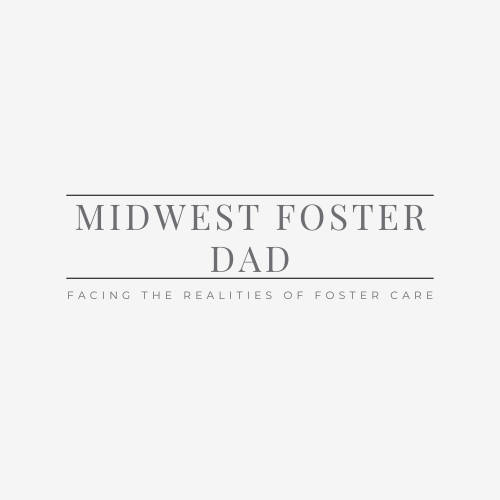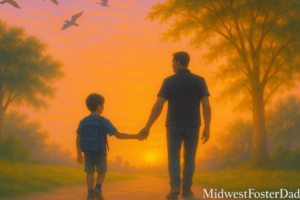The Eye of the Storm
A couple of days ago, my 11-year-old foster son said the infamous words, “I hate you!” Nothing can prepare you for the sting of those words. Kids have big feelings. Kids who’ve experienced trauma have even bigger feelings. Most parents — especially those with teenagers — have probably heard those words. Kids usually don’t say it because they mean it. Nine times out of ten, it’s a combination of emotions boiling over.
Don’t get me wrong — foster kids are no different and have those same moments. But there are also times when it comes from something deeper than what most kids experience. When my foster son said it to me, it wasn’t because of anything I did. It was because of what his bio mom didn’t do. Like many times before, she didn’t show up for her visit with him. This was the third week in a row.
Since I was the one who told him, it became my fault. I understood those emotions weren’t really directed at me. He had been holding in those feelings for weeks, and he finally reached a breaking point and exploded on the person closest to him.
He has only been placed with me for three months, but he’s been in foster care for almost two years. For the first nine years of his life, he suffered horrendous abuse. He has scars covering his back. A slight gait in his step from an old fracture that was never treated. He jumps with fear if we raise our voices.
Despite all of this, he still loves his mom unconditionally and would go back to her the first chance he got. Love transcends pain. Love truly knows no bounds.
To him, no matter what, that’s Mom.
Jumping in Head First
I’ve been fostering for three years now. Prior to that, I worked within the child welfare system for six years. From both a personal and professional perspective, I’ve seen kids at some of the lowest points in their lives — if not the lowest. When I first began working in child welfare nearly a decade ago, I was shocked at how often kids were upset about being removed from their parents’ care. In my naivety, I assumed they would be relieved to be out of an abusive situation. But after working with these kids myself, I saw firsthand that, despite potentially horrific abuse, kids still remain loyal to their parents.
As someone fortunate enough not to experience abuse or neglect growing up, it’s difficult to view things from the perspective of someone who has. Every time I try, I come to the same conclusion — I’d want out. It didn’t make sense why someone wouldn’t. But for kids who’ve actually experienced abuse, that life is all they’ve known. For all they know, it could be like that in every home — not just theirs. Many of these kids also love their parents deeply. In spite of the trauma they’ve endured, that’s still Mom and Dad. There are bad times, but also good times. They hold on to the good and try their best to forget the bad. Some kids may even blame themselves. They believe they caused their parents to act that way. That they deserved it.

A Rude Awakening
When I was a caseworker, I remember one of the first families I worked with had four kids, ranging in age from seven to fifteen. None of their fathers were regularly involved in their lives. All they had was Mom. She struggled with alcohol addiction and became violent when she drank. The family had been involved with CPS before due to concerns of possible abuse, but nothing concrete enough was found to substantiate the reports. So, as happens far too often, the case was closed. This time, however, was different.
Mom had been drinking. It was summer, and the kids just wanted to enjoy themselves and be with friends. The oldest stayed out past curfew, and when she finally got home, her mom confronted her. Usually, she didn’t say much in these situations — she had learned it was better to let her mom yell than to risk making her angrier. But this time, she had had enough. She stood up to her mom, mentioning her drinking, parenting, and the abuse. The confrontation escalated, and Mom was arrested for biting off a chunk of her child’s flesh and punching her so hard on the side of the head that she temporarily lost her hearing.
The four kids were split and placed in two foster homes. By the time I received the case, they had been in care about four months. Before I met them, I kept asking myself, “How can we possibly work toward reunification?” The abuse had gone far beyond the incident that led to Mom’s arrest — there were years of physical and emotional abuse. How do you even begin to repair that? But from the moment I met the kids, all they wanted was to go back home to Mom.
I was taken by surprise as I sat with the oldest and she asked when she’d be allowed to go home. At the time, she legally couldn’t. Not only had CPS taken temporary custody, but there was also a restraining order preventing Mom from having any unsupervised contact with her children.
As I worked with the kids, I slowly began to understand why they felt so strongly about going back to their mom. I would ask, “Even after what she did, you still want to be with her?” There was never any hesitation.
Children are wired to seek love and approval from those closest to them. Even when they’re abused, that need doesn’t go away.
Speaking to these kids, the common theme was that Mom hurt them — but next time would be different. They would get hurt, but then they’d also have enjoyable moments together as a family. That’s what they clung to. The hope that things would change. That only good times were ahead.
It was also clear that these kids were isolated from other adults and support systems. Sure, they could play with friends, but outside of school, they had very few interactions with other adults. Their mom was their sole provider and their entire world.
At first, I thought maybe the kids were in denial — or lying because they preferred home over foster care. But they weren’t in denial. They weren’t lying. They truly and deeply loved their mom. This was my first exposure to what I would later learn is trauma bonding.
They had a strong bond with the only parent they’d ever known — a parent who hurt them, yes, but also hugged them afterward. Said sorry. Promised things would be different.
That cycle becomes a hope trap.
The Push and Pull of Trauma Bonding
Trauma bonding occurs when a child experiences moments of love, comfort, or connection from the same person who hurts them. These inconsistent patterns create a strong emotional dependence, where the child craves approval and closeness from their caregiver — even when that relationship is deeply unhealthy.
In a child’s mind, it sounds like:
• “If I can just be better, maybe Mom won’t be so mad.”
• “Dad says he’s sorry… he didn’t mean it.”
• “I want to go home. I miss them.”
It’s not logical — it’s emotional. And for kids, emotional safety often feels like familiarity, even when that familiarity includes abuse.
If you want to learn more about trauma bonding, this article from the Cleveland Clinic is very informative. Check it out here.
How Foster Parents Can Support Kids Through Trauma Bonds?
By the time I became a foster parent, I had seen trauma bonds fairly regularly throughout my career. I understood the signs and the reasons. But if you’re not familiar, it can be extremely daunting to figure out how to help a child who says they hate you. Like most things in life, there isn’t a quick fix. It takes time — sometimes a lot of time. But there are ways to support them along the way.
- Validate, don’t correct. Telling a child, “But your mom hurt you,” doesn’t help. Try, “It’s okay to love your mom. That doesn’t make what she did okay — but it’s okay to miss her.”
- Offer consistent safety. Trauma bonds break slowly. Show up every day, calmly and kindly, even when your child pushes you away.
- Model healthy relationships. Kids who’ve experienced abuse need to see what love looks like — patient, safe, and unconditional.
- Use therapy as a bridge. Trauma-informed therapists can help children untangle confusing feelings and slowly rebuild trust in safe adults. Therapy is one of the most helpful resources to utilize. I would even argue it’s essential.
Healing Isn’t Linear
If there’s one thing the foster care system has taught me, it’s this: healing doesn’t happen in a straight line.
Just when you think they’re settling in, opening up, maybe even starting to trust you — bam. Something triggers them and they spiral into a meltdown, or in my case, a full-on “I hate you.”
The irony of trauma is that kids unleash their hardest emotions on the people they feel safest with. Being a foster parent means there’s a high probability you, too, will become an emotional punching bag — not because they don’t love you, but because deep down they hope you’ll love them anyway.
Most kids who’ve been abused have never been in a situation where they feel safe expressing themselves. It’s easy to assume that giving a child love and stability will “fix” everything — but that’s not how trauma works. A child who’s only known hurt and betrayal doesn’t know how to trust. Their brains are wired to survive, not to build connections. For them, survival often looks like pushing people away before they can be hurt again.
Progress is messy. It’s far from perfect. It could be three good weeks, then an awful one. Snuggles one night, screaming the next. But every time we show up, even after they spiral, we build that foundation of trust. We teach them that we’re not going anywhere — even when they try their hardest to push us away.
That’s how healing really happens.
Sticks and Stones…
We all have heard the mantra.
“Sticks and stones may break my bones, but words will never hurt me.”
Most people reading this article have probably said a variation to kids of their own. But the reality is words can and do hurt. Maybe not physically, but certainly emotionally. When my foster son told me he hated me, I knew it wasn’t truly directed at me. That doesn’t make those words sting less. When you pour your heart and energy into providing a safe, nurturing home to a child who is a stranger to you, it can be completely demoralizing to hear those words.
It can cause many sleepless nights keeping yourself up questioning what you did wrong. What did you do to make them feel so strongly? Doubts about the job you’re doing parenting them. Most advice you receive will be to focus not on their words, but the meaning behind them. While that’s true, I think you also have to address how it impacts you. It’s okay to feel sad or even angry if they say that. Hate is a strong word that evokes strong responses. For foster parents, how do you navigate this though?
We spend hours, days, even weeks collaborating with case workers, therapists, teachers, and countless others to address the child’s needs. Addressing our own feelings often takes a back seat. If you’re a foster parent, use your support system to process your emotions. It could be a friend or family, even a community on the internet. If you know someone who’s a foster parent, check in with them. Ask how they are doing. Let them know they are loved and appreciated, it means more than you know.
Final Thoughts
Moments like this have taught me that being a foster parent isn’t about being liked. It’s about being there — even when you’re the target of misplaced anger or heartbreak. It’s about showing up day after day, not just when it’s easy, but when it’s hard as hell. Demonstrating to them that no matter what they do or say, you’ll still be there with open arms.
These kids have become accustomed to being cast away or hurt by the people they trust most. The moments that sting the most — the rejection, tantrums, cold shoulders — are often tests: “Will you leave me too? Will you hurt me too?”
I can’t promise him that his mom will show up for visits. I can’t promise that life will be fair. But what I can promise is this: even on the days he says he hates me, I still love him unconditionally.
Share Your Experiences
If you’re a foster parent, kinship caregiver, or know a child with trauma, you’ve probably felt the sting of words that weren’t truly meant for you. I see you. You’re not alone in this.
I’d love to hear your story.
- Have you experienced a moment like this?
- How did you handle it?
- What helped you navigate through it?
Drop a comment below or send me a message. Let’s keep this conversation real. Foster care isn’t always pretty, but it’s worth talking about.
If this article resonated with you, I’d appreciate it if you considered sharing it with others who might be going through something similar



